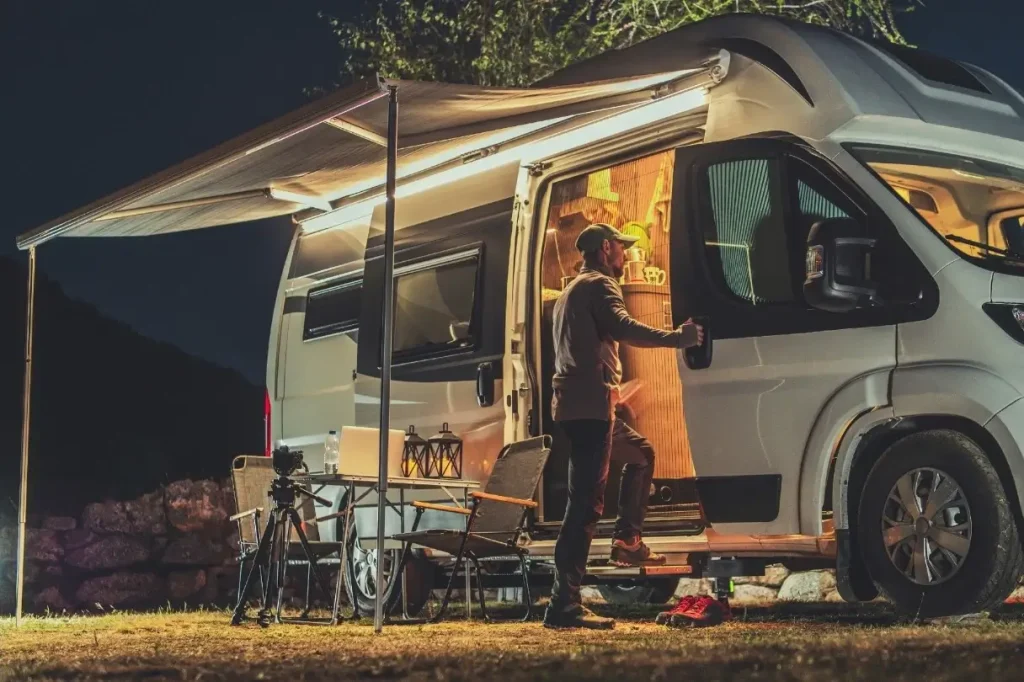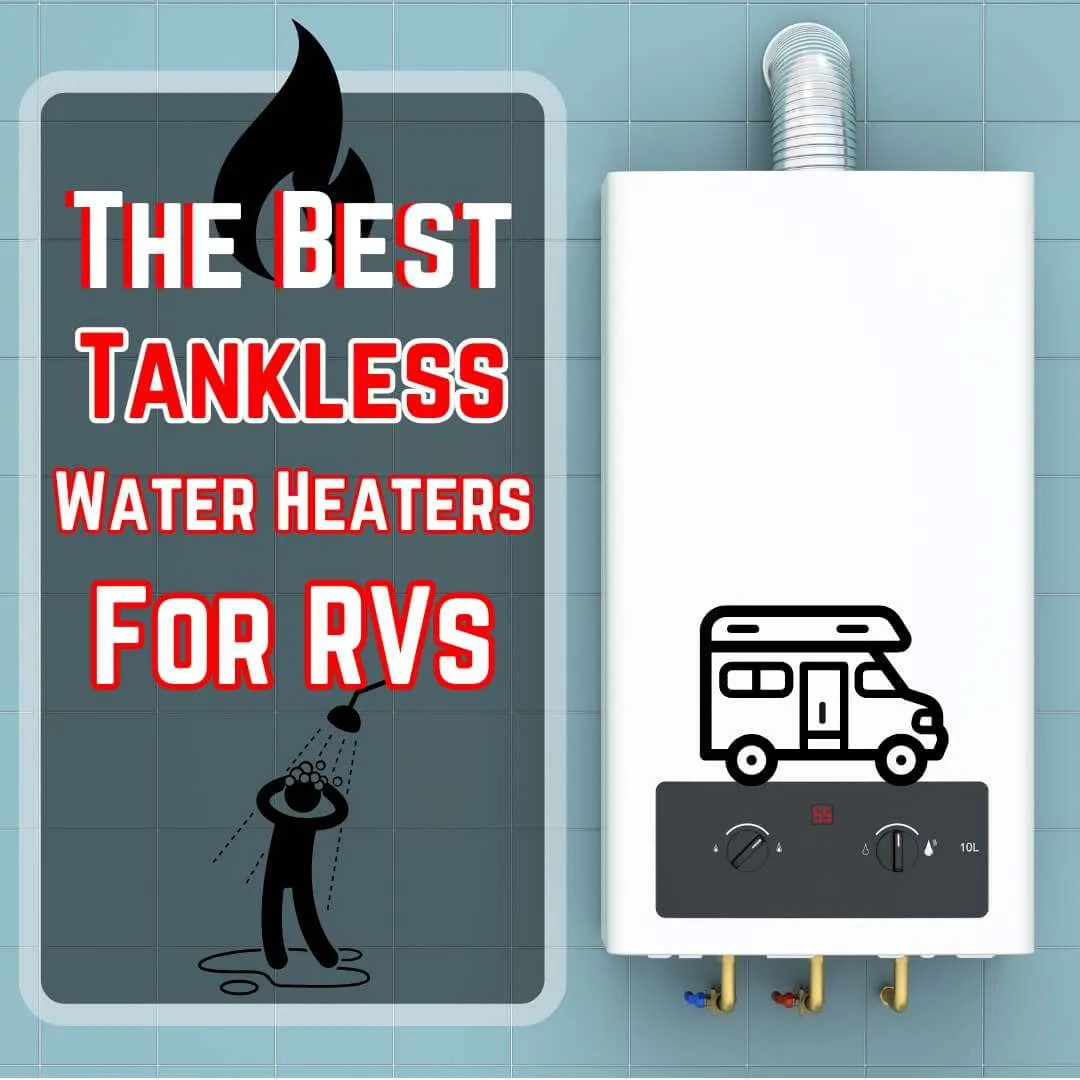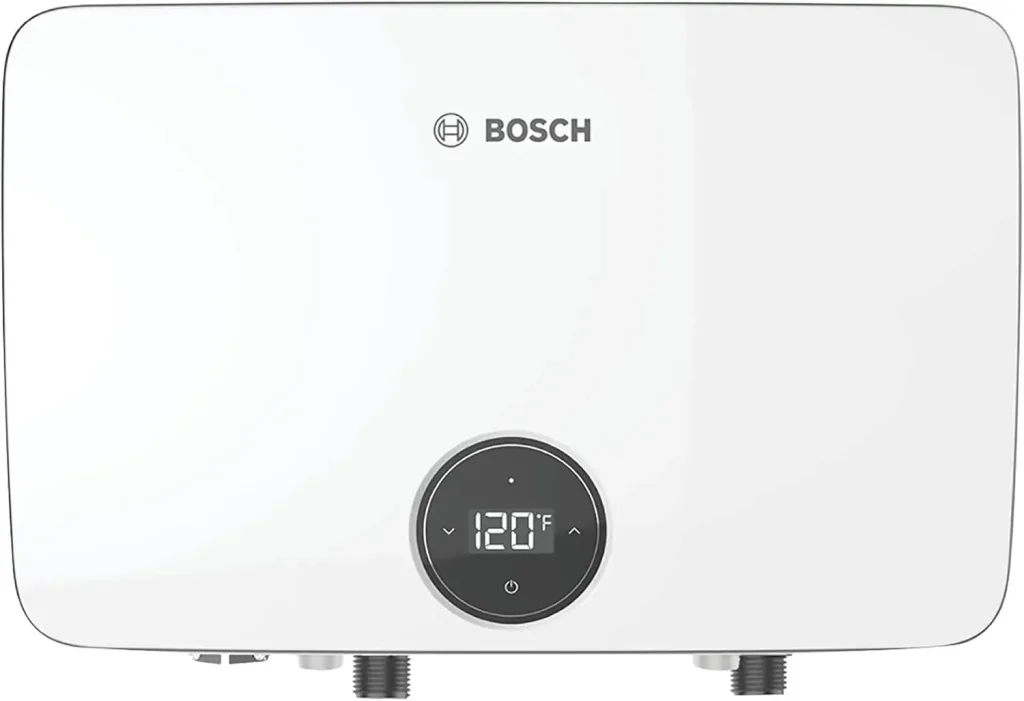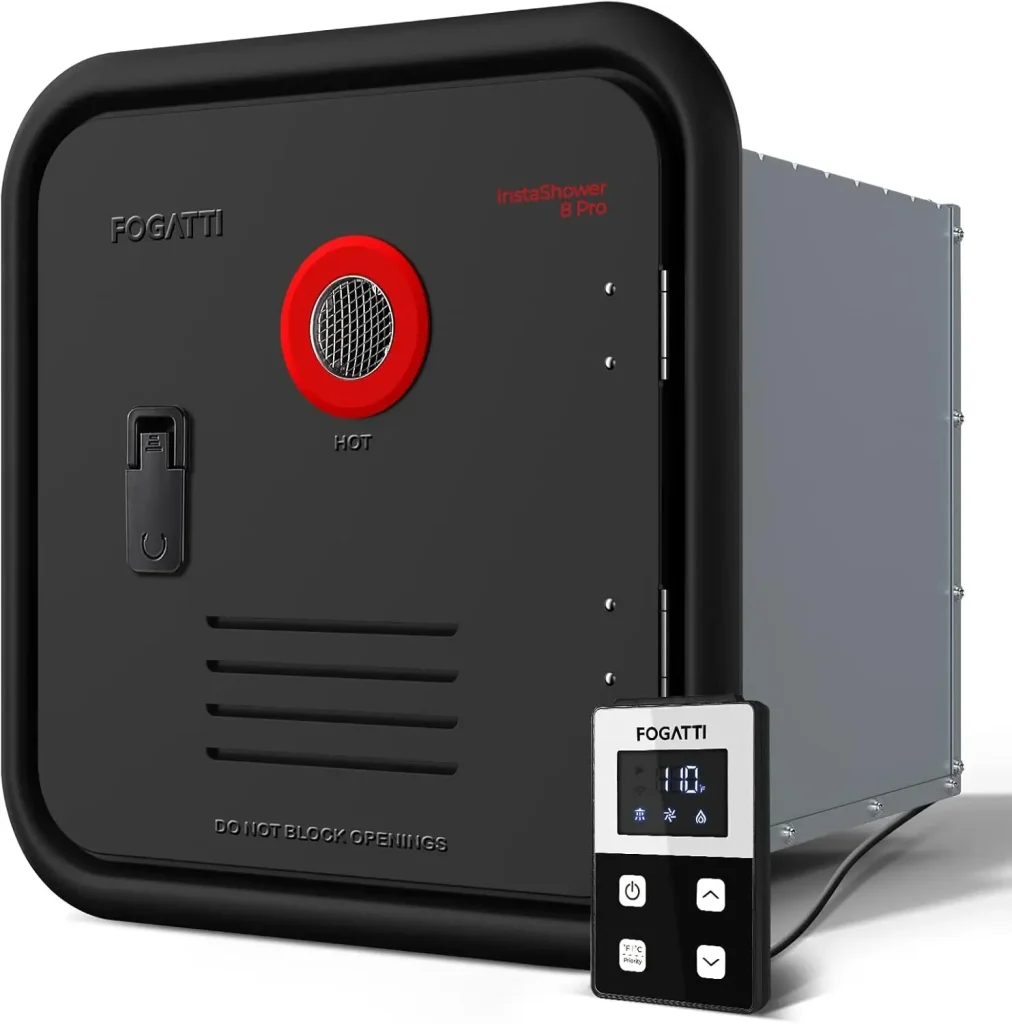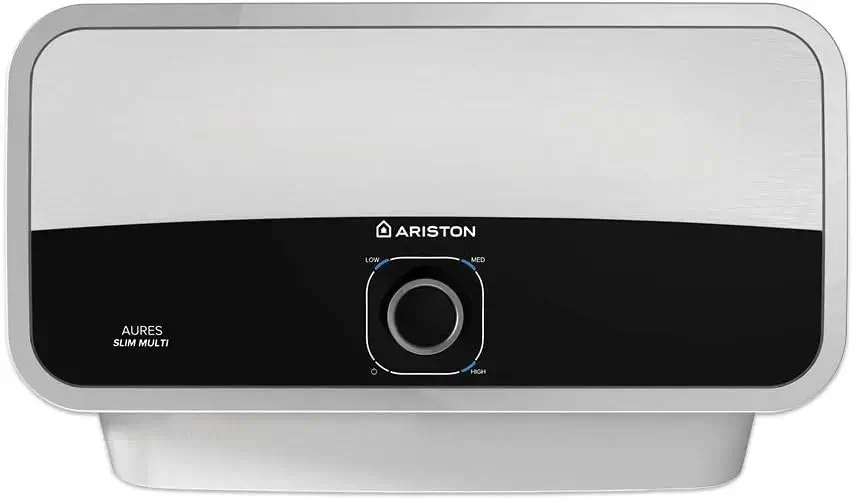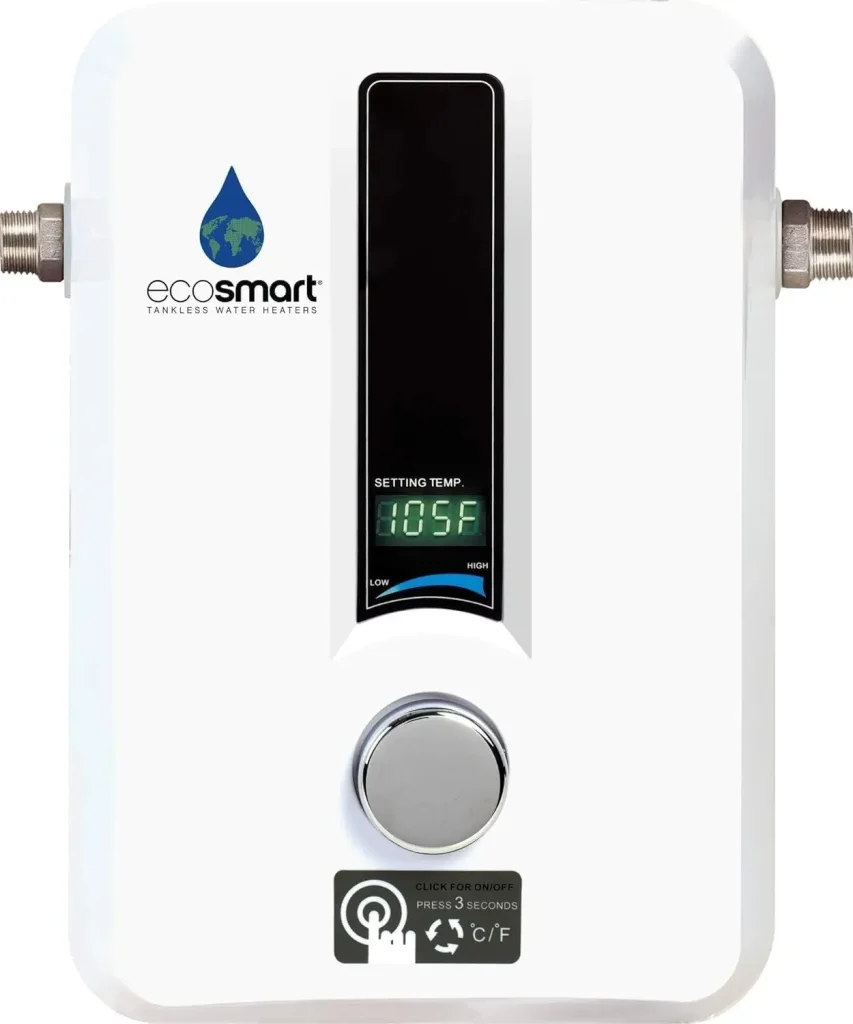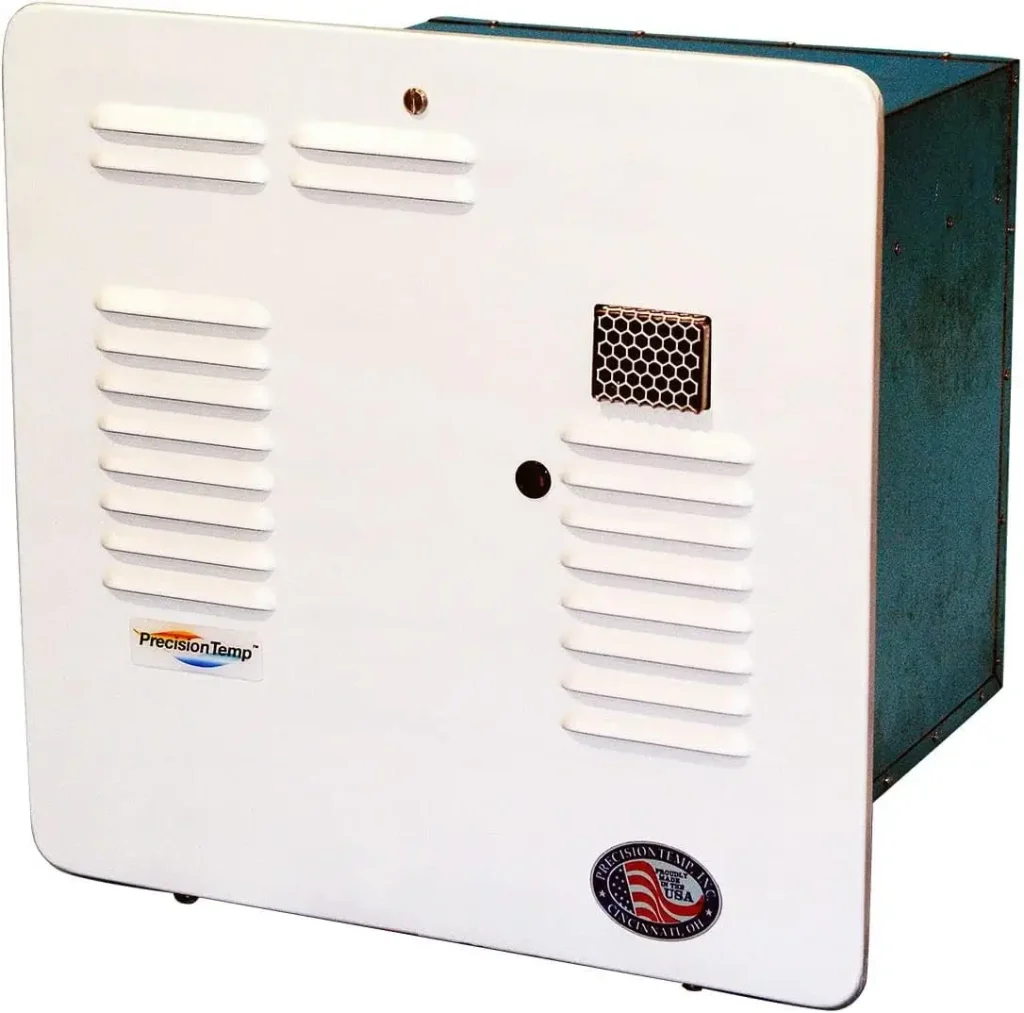Hello, RVer… What if I told you a continuous supply of near-instant hot water was available to you anytime? And no matter where the road takes you?
Well… It IS possible with the best RV tankless water heaters!
What’s the value proposition? The value proposition is no more cold showers!
Traditional water heaters are out in RVs. Drops in water temperature and pressure are old news. Running out of hot water mid-shower only to skyrocket your energy consumption on a 60-minute wait time is so mid-2000s.
I know tweaking an RV’s water or electrical system can be daunting. Doing both at the same time is pure nightmare fuel! But that’s why this expert buyer’s guide, straight from a seasoned RVer, is here to take the edge off.
We’re going to review the 5 best tankless solutions for heating water in RVs. Plus, we’ll explore all the key features you want for optimal performance.
Out with your old water heater, and in with the new! I promise: once you make the swap, there’s no going back.
Nobody said life on the road had to be uncomfortable.
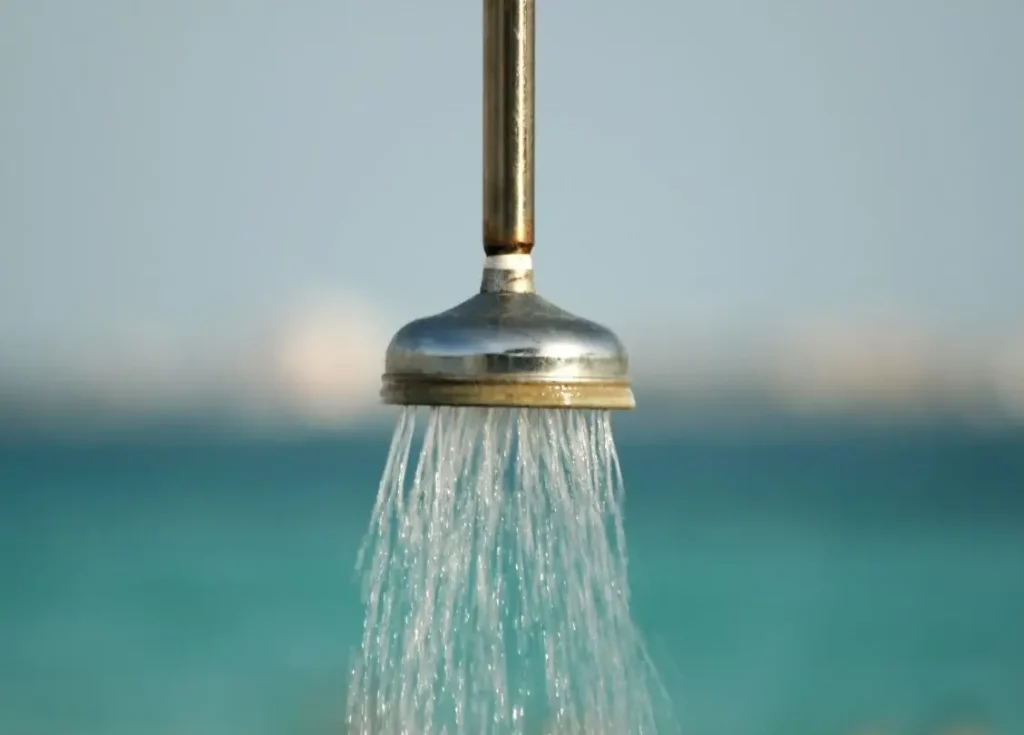
Best RV Tankless Water Heaters: Our Top 5 Picks
- Bosch Thermotechnology Tronic 6100 Electric Tankless Water Heater [Best Overall]
- Fogatti InstaShower 8 Pro RV Tankless Water Heater [Best Splurge]
- Ariston Aures Slim-Multi 10.5 kW Water Heater [Best Budget]
- EcoSmart ECO Electric Tankless Water Heater [Best Efficiency]
- PrecisionTemp RV-550 Tankless Water Heater – Wall Vented [Best Cold-Weather Performance]
What is an RV Tankless Water Heater?
An RV tankless water heater is a water heating system that provides on-demand hot water. I.e., tankless heaters only heat water when needed, rather than storing hot water in a tank. If that sounds simply genius, it’s because it is!
Traditional water heaters for RVing generally hold from 6 to 10 gallons of hot water in a tank. Furthermore, to provide an ideal constant temperature, they indefinitely heat that water. Essentially, they…
- Take up more space than a tankless water heater…
- To provide less hot water…
- Through a solution with higher energy usage.
And if your RV’s hot water tank is empty before shower time, the only thing you can do is wait.
Meanwhile, tankless RV water heaters heat water on demand. So long as you have fuel and water to heat, you have a consistent supply of endless hot water!
Tankless heaters are also more compact. They save precious space as there’s no cumbersome tank. Plus, because it’s on-demand heating, the energy savings are something serious too!
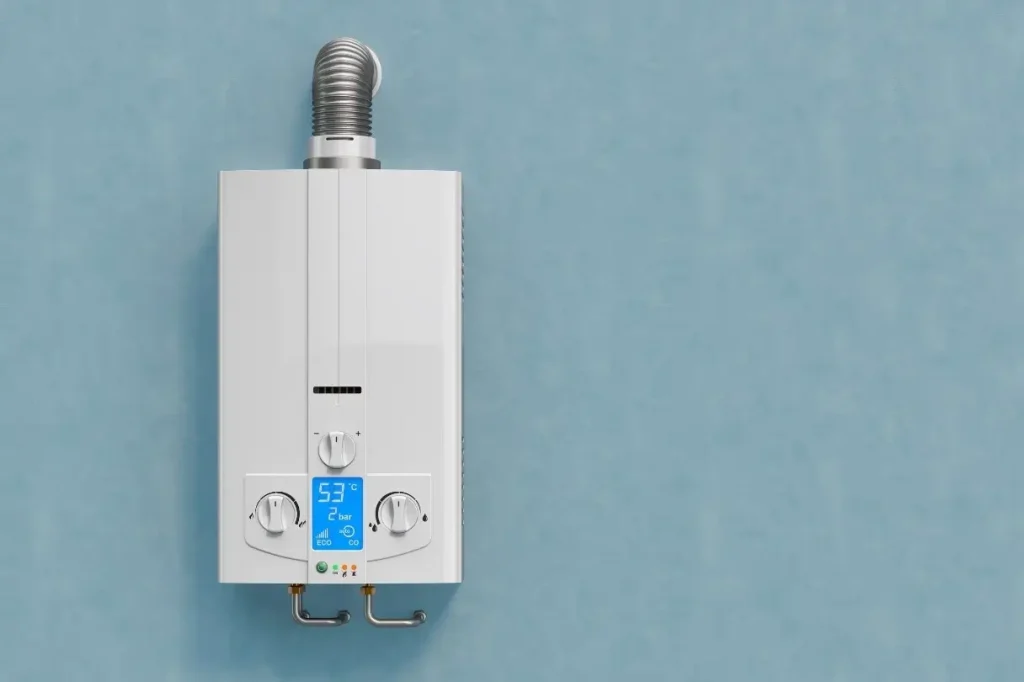
There are, of course, a handful of cons to tankless heating solutions:
- A higher upfront cost.
- An installation process. (So you might need to hire a certified technician depending on your handy-levels.)
- Plus, cheaper models can be prone to fluctuations in desired temperature. (I.e., the infamous “cold water sandwich” effect, going between hot and cold water).
But these cons are far outweighed by the pros. In particular, tankless RV water heaters are a game changer for full-time RVers, large families, and luxurious rigs running multiple high-end fixtures. (E.g., full bathroom setups complete with top-shelf RV washer-dryer combo units.)
There are still technical aspects to consider before buying a tankless hot water heater for your RV. However, the footnote is that if you’re looking at upgrading…
A modern tankless heating system is a straight upgrade to your old, clunky tank water heater.
How Does a Tankless Water Heater Work?
A tankless water heater works by heating running water as it flows through the unit. This means a steady stream of water is heated on demand rather than storing and reheating a fixed supply in a tank.
When you turn on a hot water faucet in your RV, the heater detects the water flow and activates its heating element. This instantly heats the cold water before it reaches the faucet.
Installing a tankless water heater can be a bit tricky. However, it’s not quite as tricky as it seems.
A tankless heater connects directly to your RV’s existing water lines and plumbing system:
- The cold water inlet pipe feeds water into the unit.
- The water is instantly heated as it passes through the heat exchanger.
- The hot water outlet pipe then carries the heated water to your various fixtures.

Ensuring compatibility with your RV’s water pump is also key for consistent water pressure.
Most mid- to high-range RV water pumps will be compatible with most tankless heater systems. The most important thing is that the pump delivers water at a flow rate higher than the activation threshold of the tankless heater. (But without going so high as to cause short cycling.)
Tankless heaters usually have an activation threshold of around 0.4 GPM. So if your water pump is sitting in the 1.0–3.0 GPM range, you’re golden. But for pumps with higher flow rates, I’d strongly advise installing an accumulator tank. This should prevent issues like short cycling and extend your system’s lifespan.
The Types of Tankless Water Heaters Used in RVs
Now, in terms of powering an RV’s tankless water heater, there are essentially three types of units:
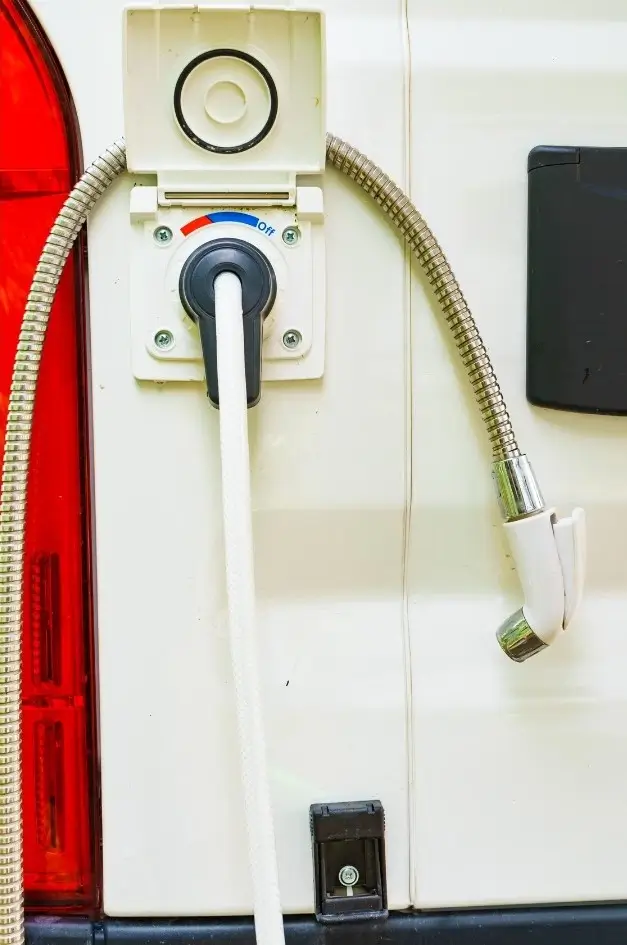
- Propane Gas Heaters use a heat exchanger powered by a gas burner. Propane-based tankless heaters are more common in RVs. They can easily operate off-grid, heat water quickly, and handle higher water flow rates effectively.
- Electric Heaters rely on high-powered heating elements to warm water as it passes through the unit. Electrical systems are more energy-efficient but also power-hungry. They typically draw 1500–3500 watts and also require 120/.240V AC power sources. As such, to operate electric units, you’ll either need shore power, a serious solar setup, or a high-capacity RV inverter integrated into your rig’s electrical system.
- Lastly, hybrid models merge both methods. They primarily use propane. However, they’re supplemented with electric heating to increase energy efficiency.
For propane models, you’ll need a propane line connection as well as proper venting to use the heater safely. Meanwhile, electric models simply wire into your RV’s electrical system, often through the breaker panel.
It might sound like a lot, but I promise it’s easier than it seems. Worst-case scenario, you contract a certified technician for the installation job.
But first, let’s dive into our top-reviewed tankless water heaters and find the right one for your RV!
Then we can worry about installing it. 😉
The 5 Best Tankless Water Heaters for RVs Reviewed
Review time. Let’s find the best RV tankless water heater for your rig!
In terms of key features…
- Water temperature settings…
- And various safety mechanisms…
…are relatively standard amongst newer RV water heaters. All of the following products include these out of the box.
We’ll dive deeper into individual features as we move through the reviews. Just keep in mind that more standardized features won’t necessarily always be highlighted.
Best Overall
1. Bosch Thermotechnology Tronic 6100 Electric Tankless Water Heater
- Power Source: Electric
- Flow Rate: Up to 3.51 GPM
- Output: 18 kW
- Dimensions: 20.25″ W x 13.25″ H x 5.125″ D
- Weight: 19.9 lbs
Taking pole position as the best overall tankless water heater for RVing is Bosch’s Tronic 6100. Naturally, this means the specs pack a punch. However, it’s the long-lasting performance and reliability engineered into every component of the Bosch that seals its placement.
As an all-electric unit, silent operations are one of the defining features of this heater. I’m not sure if you’ve ever heard a propane water heater kick into gear. But every time you turn on the hot water tap, it’s more like a roar than a whisper. Instead, the Tronic 6100 actually does run whisper-quiet.
More than that, Bosch has equipped the Tronic with thermostatic modulation. This means that the water heater automatically adjusts power based on the water flow. Those pesky fluctuating hot-cold sandwiches are eliminated, optimizing the product’s energy usage.
But there is a catch with all this electrifying value! As the highest-drawing electric heating solution on the list, you need a system to match. Full hookups to shore power are advised, or you better make sure you’re packing the best RV battery you can.
If the 18kW capacity is out of your reach, this list’s next entry running on propane gas might be a better fit. Admittedly, the Bosch tows a fine line between a tankless water heater for luxury RVs and one better for residential properties.
But if you’re living an A-Class lifestyle with a souped-up Class A system, go for the Bosch. No other water heater is going to give you this much POWER.
Best Splurge
2. Fogatti InstaShower 8 Pro RV Tankless Water Heater
- Power Source: Propane
- Flow Rate: Up to 2.9 GPM
- Output: 55,000 BTU
- Dimensions: 17.6″ W x 17.6″ H x 13.8″ D
- Weight: 35.5 lbs
Big, bold, and not afraid to flaunt it, Fogatti’s InstaShower 8 Pro is the premium choice. In terms of final results, it’s not too much different from the Tronic 6100. You could just call this the best propane tankless RV water heater on the list. But there are some key differences to consider if you’re choosing between this and the Bosch.
Firstly, in exchange for forgoing the Bosch’s electrical design, you also sacrifice its compact size. Instead, the InstaShower is big, boxy, and rather heavy. That’s a common trait among gas-based tankless heaters. But nevertheless, it’s still vital you plan for this purchase.
But that’s where the cons stop and the fun times begin! In exchange for a more difficult installation, you get top-tier performance.
The InstaShower 8 Pro offers high-tech precision mered with superior build quality. It has a built-in digital controller that can be mounted separately from the heater. This allows for precise control of the water temperature without having to navigate to the somewhat cumbersome unit.
Moreover, Fogatti has breezed ahead with energy-saving safety features. Dual temperature sensors and a flame monitoring system are on full display here. These features ensure safe, efficient heating without overheating or energy waste.
Plus, there’s on-board freeze protection too. Together, this maximizes the heater’s performance when RVing in wintry climates.
It’s still a higher upfront cost than the Tronic 6100 without the compact design. But in return, you get a very similar heat output with a much easier-to-run unit. Propane gas often edges out massive electrical draws in RVs. Plus, you’re just under that 3.0 GPM flow rate where RV plumbing gets more complicated.
If you like the performance of the Bosch but were hoping to move away from electric methods, the InstaShower is the heater for you!
Best Budget
3. Ariston Aures Slim-Multi 10.5 kW Water Heater
- Power Source: Electric
- Flow Rate: Up to 2 GPM
- Output: 10.5 kW
- Dimensions: 7.3″H x 11.8″W x 3.5″D
- Weight: 5.1 lbs
Or we can knock things down to the budget water heating solution. With a compact design and modest 10.5 kW output, the Aures is the choice that won’t drain your power (or cash) reserves!
Firstly, that ultra-slim profile is no joke in cramped RV compartments. This humbler water heater can be effectively mounted much more freely. (And potentially even under your RV’s sink, depending on your setup.)
But that simplicity in the build continues with the Ariston’s design. Instead of precise controls, you’re given three easy settings:
- Low
- Medium
- High
Plus the unit also utilizes durable, corrosion-resistant materials to reduce maintenance needs. Overall, the Ariston Aures is aimed at being a set-and-forget RV water heater!
But the more modest approach of this product is also its downside. With a flow rate of up to 2.04 GPM, this heater isn’t going to be able to handle back-to-back showers while other fixtures are gushing. But it’s still more than capable of providing a steady stream to a single hot water tap (or hot shower) at once.
It really comes down to your needs. At a quarter the cost of our top picks, you’re cutting out a lot of upfront and ongoing costs without losing quality. This affordable, efficient, and compact design is perfect for solo travelers with smaller rigs (e.g. Class Bs).
But Class C RVs, more compact Class A motorhomes, and towables with multiple appliances will struggle with this heater’s output. If you’re traveling in style, I’d recommend the Tronic or InstaShower instead.
Best Efficiency
4. EcoSmart ECO Electric Tankless Water Heater
- Power Source: Electric
- Flow Rate: Up to 3.1 GPM
- Output: 13 kW
- Dimensions: 11.5″ W x 8″ H x 3.8″ D
- Weight: 6.5 lbs
Let’s talk energy efficiency. The EcoSmart ECO 11 is the go-to tankless water heater for energy-saving RVers. This system maximizes heating efficiency with minimal energy wastage.
The primo feature of the EcoSmart driving this efficiency is its self-modulating technology. This enables auto-adjustment of its power output per your hot water demands. The EcoSmart only uses as much power as needed. And it does so while staying within one degree of your water temperature settings.
Moreover, the ECO 11 proudly boasts a ts 99.8% thermal efficiency rating. Some electric models (such as the Bosch) have monumentally high power draws. Propane models lose heat through venting. But the EcoSmart uses every bit of energy this unit pulls in and then some!
There’s no unnecessary energy use with this unit. Plus that means you’re conserving water by extension too. All you get is a steady, optimized flow of instant hot water without waste.
Overall, it’s a fantastic, compact unit rivaling the Ariston’s ultra-slim design. (But just with a higher flow and heating output.) I’ve heard reports that in very cold weather, heat-up time and performance can flag. And it’s definitely a unit better equipped for couples or soloists—not families.
But some caveats are to be expected for a device that’s not chowing down on joules. If you have lower water heating demands and want lower costs to match, the ECO 11 is the solution for you. Ultimately, if I was going boondocking in the wilds, I’d still lean towards a gas heater instead.
But for those frigid wild camping experiences with limitless hot water, we have one final option.
Best Cold-Weather Performance
5. PrecisionTemp RV-550 Tankless Water Heater – Wall Vented
- Power Source: Propane
- Flow Rate: Up to 2.5 GPM
- Output: 55,000 BTU
- Dimensions: 13.5″ W x 13.5″ H x 14.3″ D
- Weight: 32 lbs
With enough gas, not even the Alaskan tundras can stop you now! The RV-550 is built for road-warriors who refuse to let the perils of winter slow their charge.
The PrecisionTemp is designed specifically for cold-weather performance. It’s a propane-propelled powerhouse that guarantees heat and water pressure, even in freezing conditions. Furthermore, this heater is specifically engineered for RV water systems and lifestyles. As long as you got gas, you got hot water flowing.
To begin, the RV-550 heats hard and is a smooth operator. At 55,000 BTU of output, it rivals the capacity of the InstaShower, nearly matching its water flow rate too.
However, the InstaShower had limited levels of freeze resistance. The RV-550 is instead the choice for full-blown winterized RV setups.
Most tankless propane gas heaters struggle with severe temperature drops. But the RV-550 comes loaded with full-scale automatic freeze protection. This mechanism maintains functionality even when parked in subzero climates.
Unfortunately, it doesn’t also utilize the digital control interface of the InstaShower. Neither does its flow rate hit the same benchmark, so be more cautious of multi-appliance use. However, ultimately, you’re paying less for less but without sacrificing core performance.
It’s easily one of the best RV water heaters if you’re after a winter-ready tankless gas system. Propane uses arguably fewer resources when off-grid, including water and ongoing fuel costs. So if you’re an avid boondocker for all seasons, this might be the best hot water solution for you on the list!
But if you prefer the comfort of powered hookups, an electric system might be better for you.
FAQs About Tankless Water Heaters and RVs
Alrighty! You’ve seen the best tankless water heaters in the RV space. You’ve weighed up the pros and cons of tank vs tankless heating.
Now let’s answer some burning queries!
Why Do You Need a Tankless Water Heater?
Primarily, tankless systems eliminate the frustration of running out of hot water. (An issue often encountered in RVs with tank water heaters.) Additionally, they’re cheaper in an ongoing capacity too! (As there’s no tank of water being constantly heated for use.)
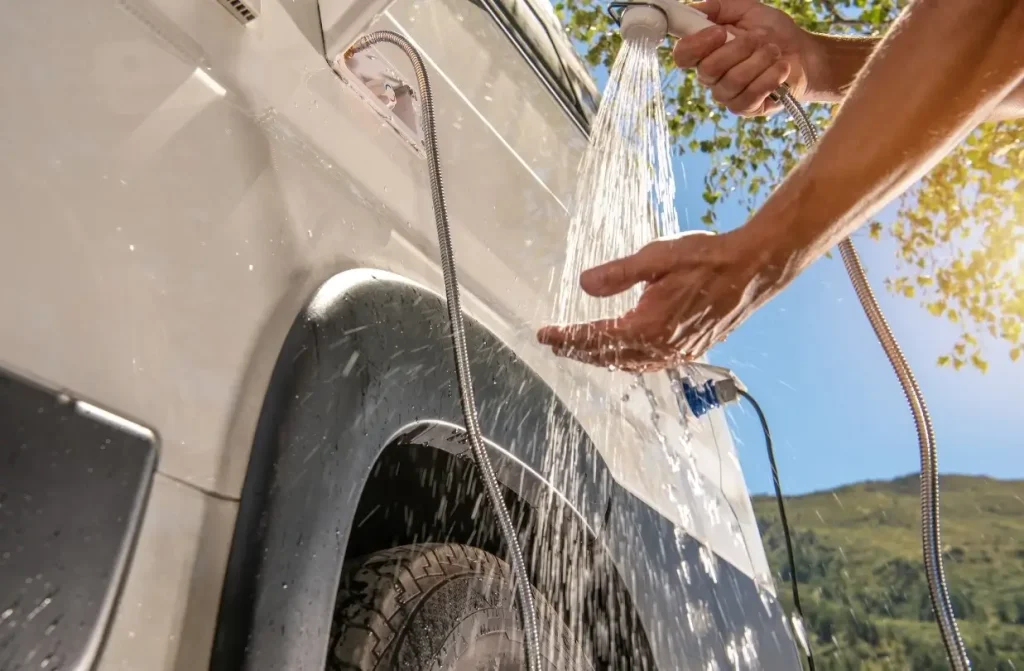
With careful resource management, solo travelers might not need one. Smaller rigs that don’t need as much on-demand hot water might get by fine utilizing water tanks. But for families, multi-fixture rigs, and even couples, tankless RV water heaters are 100% the way to go.
What Are the Advantages of Using a Tankless Water Heater in My Camper?
The biggest advantage of tankless RV water heaters is their on-demand heating capabilities. This is followed by their overall energy savings as a close second.
For consistent flow rates and water pressure, tanked models usually score higher. But for on-demand, energy-efficient hot water, tankless is the clear winner. Plus as a bonus, tankless systems are more compact and easier to install.
What Type of Gas Is Required for Tankless Water Heaters?
Most tankless water heaters designed for RVing run on propane (LP gas). Propane is widely available and super easy to use when dry camping.
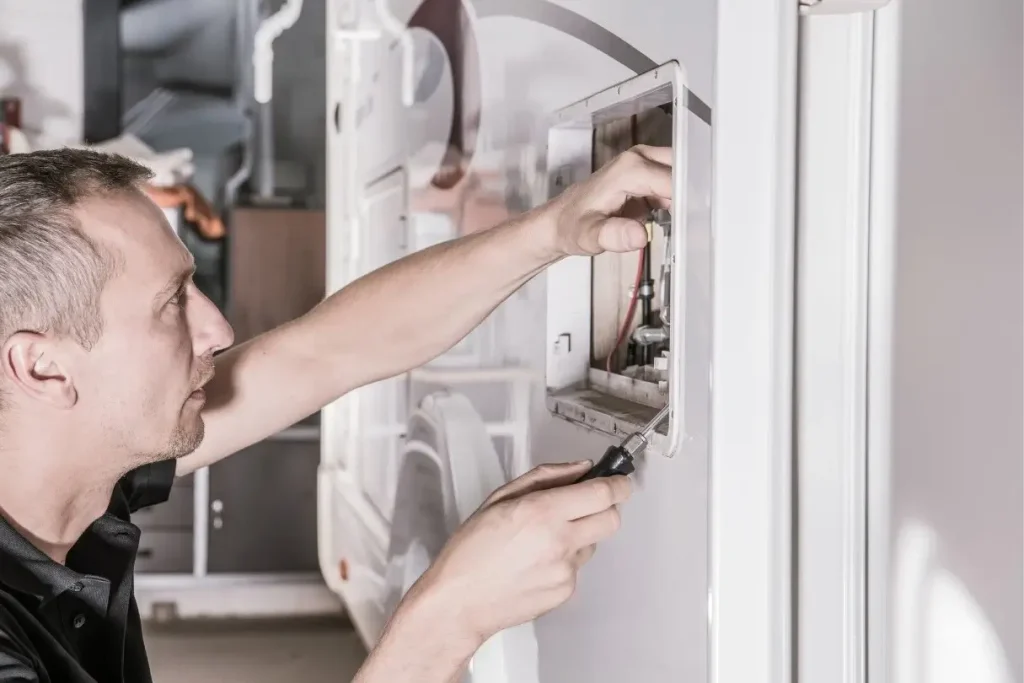
Under special circumstances, you might encounter tankless butane or diesel heating systems. But those are incredibly rare. More than likely, you’ll see a lot of hybrid models in RVs. These units integrate electric and gas heating for a more synergetic solution.
Our Verdict: What’s the Best Tankless Water Heater for Hot Water on the Go?
All done. Long showers and unlimited hot water are only an installation away.
So overall, what’s the final verdict? Who makes the best tankless water heater for RVing? Well, I’m going to actually split the pot.
For an electric model, provided you have the system to run it, Bosch’s Tronic 6100 is the beast of the ball. It’s not for smaller rigs at all. But for big luxury mobile homes and nomadic fam-bams, it’s got the oomph you need.
But if you prefer gas heating or the off-grid lifestyle, the Fogatti InstaShower Pro 8 is the better fit. It takes a bit more effort to install, and it’s more costly overall. But the long-term payoff—including running costs—is well worth the investment.
Otherwise, ditch the tank. Hook up that water inlet. Go exploring!
There are trails to hike. Lakes to boat. Fishes to fish!
And ultimately, we might not all agree on the best type of RV water heater. But there is one thing we can all concede to…
RV life just gets better with a stinkin’ hot shower and comfy bed to crawl into after a hard day’s adventuring.
